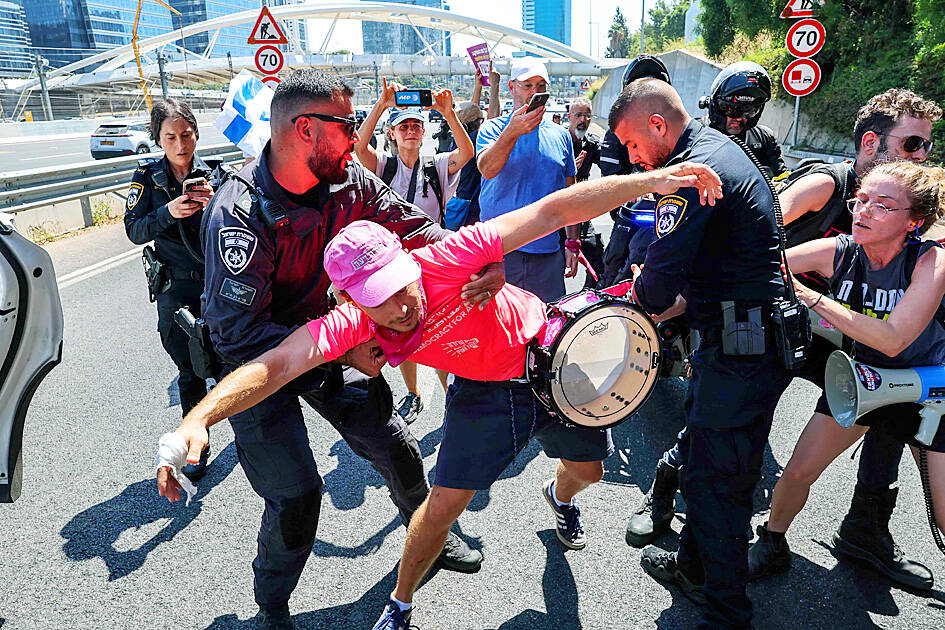Israeli protesters took to the streets for a second day yesterday and the largest trade union launched a general strike to press the government to reach a deal to return hostages still held by Hamas, after six more captives were found dead in Gaza.
The strike disrupted transportation and medical services in several Israeli districts, and many shops and businesses were closed after the head of the Histadrut union, which represents hundreds of thousands of workers, called for a general stoppage.
The recovery of the six hostages, who were shot dead between 48 and 72 hours before being found on Sunday by Israeli forces triggered a wave of grief and fury in Israel, prompting at least half a million people to take to the streets in Jerusalem and Tel Aviv that day.

Photo: AFP
The demonstrators were demanding Israeli Prime Minister Benjamin Netanyahu reach a ceasefire agreement with Palestinian militant group Hamas to bring the remaining hostages home.
Thousands again gathered yesterday in Tel Aviv, waving the Israeli flag or holding photographs of the remaining 101 hostages.
Yehuda Ullmann, head of the surgery division at Rambam Hospital in Haifa, said the strike went against the grain of doctors dedicated to saving patients.
“But we are in a very, very hard situation now, we and all the country, because of the hostages. And yesterday it was maybe the hardest day,” he said. “We can’t stand aside and that’s why we came into a strike.”
Following an intervention by Israeli Minister of Finance Bezalel Smotrich, Israel’s Labor Court ruled the general strike must end at 2:30pm, saying the strike had no economic basis and was largely political.
Histadrut accepted the ruling.
“We live in a country of law and respect the court’s decision, therefore I instruct everyone to return to work at 2:30pm,” Histadrut chairman Arnon Bar-David said, a day after he described the strike as “a cry for the return of the hostages.”
Some services at Ben Gurion Airport, Israel’s main air transport hub, were suspended in the morning, although incoming flights were still landing, while bus and light rail services in many areas were either canceled or only partially functioning.
Workers at Israel’s main commercial port Haifa and some municipalities also went on strike.
Hospitals were only partially operating and banks were not working, but many private sector businesses were open.
The strike was backed by several employer groups, including manufacturers and the high-tech sector, and many employers were allowing staff to join the strike so many services were disrupted.
The demonstrations follow months of protests by families representing some of the hostages and underscore the deep divisions in Israel over Netanyahu’s approach to securing a ceasefire deal.
Despite pressure from his own defense minister, as well as senior generals and intelligence officials, Netanyahu has insisted on maintaining Israeli troops in key points of the Gaza Strip after any ceasefire.
Hamas has rejected any Israeli presence and despite the efforts of Egyptian and Qatari diplomats and repeated visits to the region by senior US officials urging a deal, there has been no sign of a breakthrough in talks to halt the fighting and bring the hostages home.

SECURITY: As China is ‘reshaping’ Hong Kong’s population, Taiwan must raise the eligibility threshold for applications from Hong Kongers, Chiu Chui-cheng said When Hong Kong and Macau citizens apply for residency in Taiwan, it would be under a new category that includes a “national security observation period,” Mainland Affairs Council (MAC) Minister Chiu Chui-cheng (邱垂正) said yesterday. President William Lai (賴清德) on March 13 announced 17 strategies to counter China’s aggression toward Taiwan, including incorporating national security considerations into the review process for residency applications from Hong Kong and Macau citizens. The situation in Hong Kong is constantly changing, Chiu said to media yesterday on the sidelines of the Taipei Technology Run hosted by the Taipei Neihu Technology Park Development Association. With

CARROT AND STICK: While unrelenting in its military threats, China attracted nearly 40,000 Taiwanese to over 400 business events last year Nearly 40,000 Taiwanese last year joined industry events in China, such as conferences and trade fairs, supported by the Chinese government, a study showed yesterday, as Beijing ramps up a charm offensive toward Taipei alongside military pressure. China has long taken a carrot-and-stick approach to Taiwan, threatening it with the prospect of military action while reaching out to those it believes are amenable to Beijing’s point of view. Taiwanese security officials are wary of what they see as Beijing’s influence campaigns to sway public opinion after Taipei and Beijing gradually resumed travel links halted by the COVID-19 pandemic, but the scale of

A US Marine Corps regiment equipped with Naval Strike Missiles (NSM) is set to participate in the upcoming Balikatan 25 exercise in the Luzon Strait, marking the system’s first-ever deployment in the Philippines. US and Philippine officials have separately confirmed that the Navy Marine Expeditionary Ship Interdiction System (NMESIS) — the mobile launch platform for the Naval Strike Missile — would take part in the joint exercise. The missiles are being deployed to “a strategic first island chain chokepoint” in the waters between Taiwan proper and the Philippines, US-based Naval News reported. “The Luzon Strait and Bashi Channel represent a critical access

Pope Francis is be laid to rest on Saturday after lying in state for three days in St Peter’s Basilica, where the faithful are expected to flock to pay their respects to history’s first Latin American pontiff. The cardinals met yesterday in the Vatican’s synod hall to chart the next steps before a conclave begins to choose Francis’ successor, as condolences poured in from around the world. According to current norms, the conclave must begin between May 5 and 10. The cardinals set the funeral for Saturday at 10am in St Peter’s Square, to be celebrated by the dean of the College